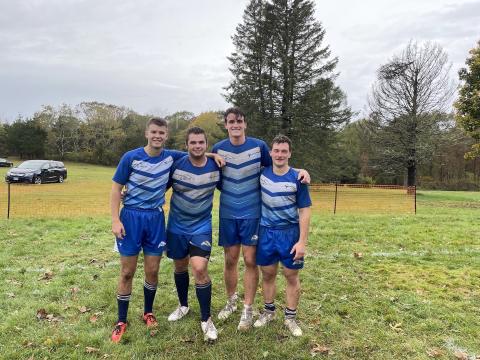
Peter Logee enjoyed his undergraduate years at UNH so much that when it was time for graduate studies, Paul College was the perfect choice. He says the resources for students, knowledgeable and helpful professors, and career support are help students be successful their classes and in their profession.
Why did you decide to pursue a graduate degree? Why your particular program?
I completed my undergraduate degree in Applied Mathematics focusing in Economics, so with a background in STEM and an interest in business and finance, I figured that the MSF program would be right for me.
There is also a lot of stress that comes with entering the job market after college, so knowing that I could finish the program and have a Master's degree within a year after my undergrad was extremely appealing and certainly helped me land a great job following the program.
Why did you choose UNH and Paul College?
I completed my undergraduate degree at UNH, and really enjoyed my time in Durham. Many of my undergrad courses were in economics, so I had experience with Paul College and was always impressed. There are a ton of resources for students, and every instructor is extremely knowledgeable and helpful, allowing any student to be successful in their classes and in their career.

Tell us about a favorite class and/or professor.
My favorite so far has been Investments with Professor Ciccone. The class was a great introduction to finance and investments as someone with limited background, and Professor Ciccone was always enthusiastic and very insightful and helpful with any questions I needed answered.
Tell us about something you have learned/discovered during your program that surprised you. How do you think you will apply it professionally?
I was surprised to learn the range of topics covered in the program. In addition to the fundamentals of finance and investing, we'll be learning about accounting and reporting, programming, financial modeling, data analytics, and many other topics that may not typically come to mind when someone thinks about finance.
In my short time working in finance professionally, I quickly learned how important these skills are to have, especially as the industry continues to advance technologically. High level programming and data analytics skills are extremely valuable to have in a career in finance.

Looking back on your time at UNH, what are you most proud of and why?
I'm most proud of my commitment to learning valuable skills at a high level. Both my undergraduate degree in Applied Mathematics and my graduate degree in Finance require a lot of time and effort to succeed, and even still they can be very challenging and frustrating. Despite that, I've always been committed to putting my academics above all else and achieving at a high level, which I did in my undergrad and continue to do in my graduate studies.
What do you like most about Paul College?
I appreciate that Paul College not only values what you do while in your time at UNH, but also after you leave and begin your career. The Career and Professional Success team has always been a great resource to me, all the way from building out an effective resume, to helping me navigate career fairs, to negotiating my first job offer.
What do you consider to be the strengths of your academic program?
I think that the pace of the program allows for efficient yet effective learning. This is a very fast paced program, yet I don't feel as though we're skipping over any major topics and the pacing still gives me enough time to absorb and apply the concepts learned in class.
Do you have any advice for others who may be interested in this program?
I would definitely recommend joining the program, and while you're here I would recommend involving yourself in things outside of class as well. Maybe this is a club, a sports team, a job, a hobby, etc., but I think finding a good balance between school and life is extremely important.
Are you currently working? If so, where?
I don't have a job while in this program, but I've accepted a position at Fidelity Investments following completion of my degree.
How do you hope this program will help you advance or pivot in your career?
I think that my undergrad degree in Applied Mathematics gave me many widely applicable skills that could lend themselves to many different roles, but my MS Finance degree is helping me gain expertise in specifically finance. I think this will help me to specialize in the field and advance my career more rapidly than with a degree as broad as Mathematics.